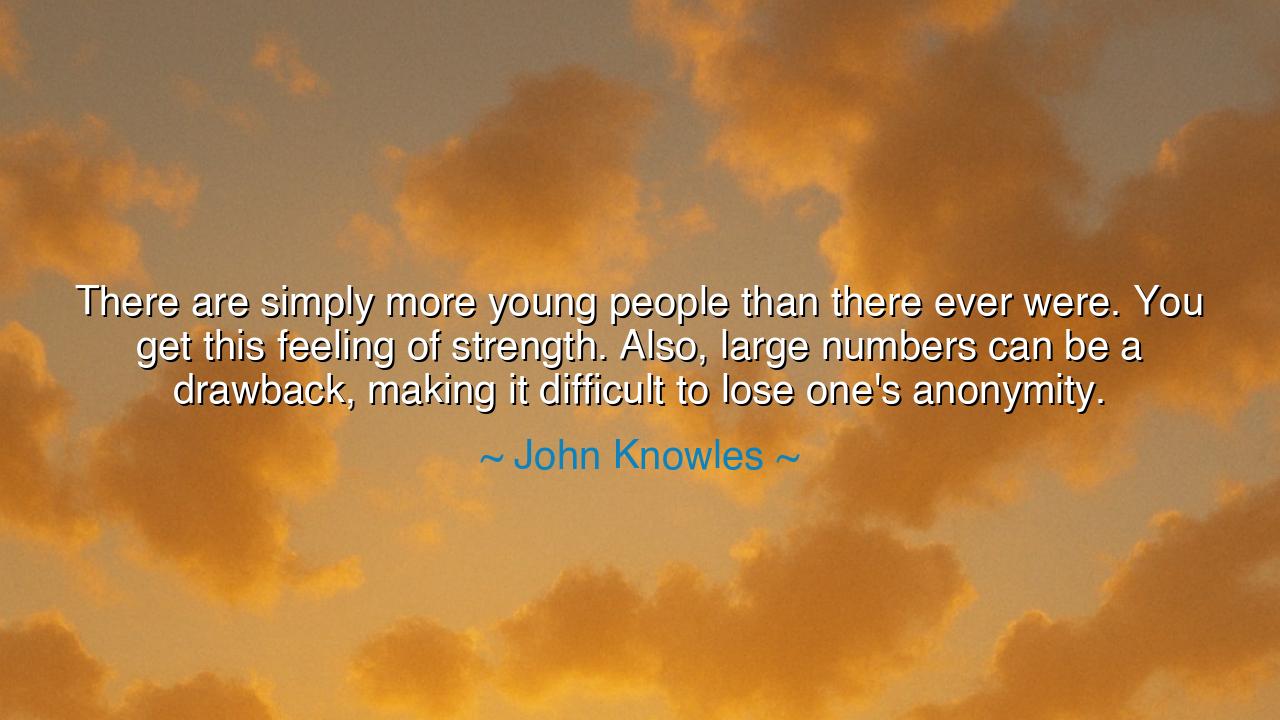
There are simply more young people than there ever were. You get
There are simply more young people than there ever were. You get this feeling of strength. Also, large numbers can be a drawback, making it difficult to lose one's anonymity.






John Knowles, with keen perception of the tides of youth, once declared: “There are simply more young people than there ever were. You get this feeling of strength. Also, large numbers can be a drawback, making it difficult to lose one's anonymity.” These words, though simple, echo with the eternal rhythm of generations rising like waves upon the shore. They remind us of the dual nature of youth’s abundance — a force both mighty and perilous, a multitude brimming with vitality yet struggling against the weight of its own size.
The meaning of this teaching lies in the paradox of strength and loss. When the young gather in vast numbers, they feel a power in their shared presence, a vigor that surges like the spring flood. It is intoxicating, for in great strength they see possibility, change, and the triumph of new life over old. Yet, hidden within this strength is also the shadow: the difficulty of being seen, of being known as an individual soul. Where numbers swell too great, the flame of one can be lost in the bonfire of many. Thus, what grants might can also diminish identity.
The ancients, too, understood this truth. When the armies of Xerxes marched upon Greece, the strength of their numbers shook the earth. Yet within those countless ranks, who could discern one soldier from another? They were mighty, yet faceless, and their power was undone by a few hundred Spartans who stood with unyielding purpose. There is a lesson here: strength in numbers is real, but greatness is found when the multitude does not swallow individuality, when each still bears his own name, his own flame, his own unshaken resolve.
Think also of the youth movements of more recent times. In the 1960s, millions of young people rose together across nations, demanding freedom, justice, and new ways of living. Their numbers gave them force, their unity made the world listen. Yet among them, many struggled to find their own voices, lost amid chants and slogans, their unique songs drowned by the chorus. The power of the mass brought change, but the danger of anonymity lingered: who am I, within so many? Here we see Knowles’ insight alive in history — the gift and the burden of the multitude.
The teaching, then, is not to reject either side but to hold both in balance. Rejoice in the strength of fellowship, for there is power when the young gather as one. But guard also the soul’s uniqueness. For a man without individuality is as a leaf swept in the river’s flood — carried, but not choosing. To be part of the multitude is a blessing, but to lose oneself within it is a sorrow. Thus, the wise youth learns to stand both with the many and apart from them, taking strength from numbers but never surrendering the flame of the self.
Practical is this counsel: when you walk among crowds, remember your name. When you add your voice to the chorus, do not forget the song that only you can sing. Seek fellowship, but also solitude; be part of the strength of your generation, but also guard the sacred space where your individuality dwells. Speak when others speak, but do not be afraid to stand silent when silence is truer to your heart. In this balance, you will gain both the power of the many and the dignity of the one.
Therefore, children of tomorrow, heed the wisdom of Knowles. Large numbers are both a shield and a shadow. Take from them the courage of unity, but do not allow anonymity to swallow the brightness of your soul. Stand proudly in the multitude, yet carry within yourself the unshakable remembrance: I am not only one of many, I am also myself. In this union of the collective and the individual, the true strength of youth shall be revealed — a force that shakes the world, yet never forgets the worth of each living spirit.






AAdministratorAdministrator
Welcome, honored guests. Please leave a comment, we will respond soon